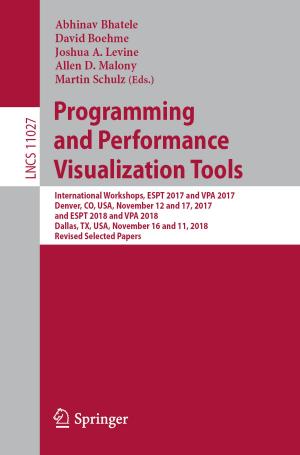Crop Improvement
Sustainability Through Leading-Edge Technology
Nonfiction, Science & Nature, Science, Biological Sciences, Biotechnology, Technology, Agriculture & Animal Husbandry| Author: | ISBN: | 9783319650791 | |
| Publisher: | Springer International Publishing | Publication: | October 17, 2017 |
| Imprint: | Springer | Language: | English |
| Author: | |
| ISBN: | 9783319650791 |
| Publisher: | Springer International Publishing |
| Publication: | October 17, 2017 |
| Imprint: | Springer |
| Language: | English |
The book covers the latest development in the biosciences field covering key topics in crop improvement including ‘omic approaches to improving sustainable crop production, advancement in marker technology, strategies in genetic manipulation, crop quality and sustainability and plant microbe interaction detailing on proven technologies to address critical issue for agricultural sustainability which are beneficial for researchers and students. The book also includes aspects of preserving crops after harvest as this is a key factor in promoting sustainable crop quality in terms of addressing waste, choosing the appropriate packaging and moving crops through the food and industrial supply chain.
An important strategy to overcome the challenges in providing food for the world population in a sustainable manner is through concerted efforts by crop scientists to embrace new technologies in increasing yield, quality and improving food safety while minimizing adverse environmental impact of the agricultural activities. Most of the proven molecular and genetic technologies in crop science have been tested and verified in model plants such as Arabidopsis and tomato. The technologies, when deployed on various plant species of importance for human nutrition and industrial applications, including cereals, vegetables, fruits, herbs, fibre and oil crops, face many challenges, not only due to their longer life cycle but many other physiological and environmental factors affecting yield and quality of plant products.Furthermore, major impacts on crop production due to catastrophic diseases and global climate change needs urgent and innovative solutions. Therefore a systematic approach, employing various leading-edge technologies that enable the functional elucidation of key pathway genes via ‘omics tools, genome wide association with desired phenotypes and development of cost effective and practicable molecular tools for selection, is vital. The International Conference on Crop Improvement was held to address these and other pressing issues. This volume summarizes the keynote presentations from the meeting and highlights addition discussions that are critical to crop improvement in a challenging time.
The book covers the latest development in the biosciences field covering key topics in crop improvement including ‘omic approaches to improving sustainable crop production, advancement in marker technology, strategies in genetic manipulation, crop quality and sustainability and plant microbe interaction detailing on proven technologies to address critical issue for agricultural sustainability which are beneficial for researchers and students. The book also includes aspects of preserving crops after harvest as this is a key factor in promoting sustainable crop quality in terms of addressing waste, choosing the appropriate packaging and moving crops through the food and industrial supply chain.
An important strategy to overcome the challenges in providing food for the world population in a sustainable manner is through concerted efforts by crop scientists to embrace new technologies in increasing yield, quality and improving food safety while minimizing adverse environmental impact of the agricultural activities. Most of the proven molecular and genetic technologies in crop science have been tested and verified in model plants such as Arabidopsis and tomato. The technologies, when deployed on various plant species of importance for human nutrition and industrial applications, including cereals, vegetables, fruits, herbs, fibre and oil crops, face many challenges, not only due to their longer life cycle but many other physiological and environmental factors affecting yield and quality of plant products.Furthermore, major impacts on crop production due to catastrophic diseases and global climate change needs urgent and innovative solutions. Therefore a systematic approach, employing various leading-edge technologies that enable the functional elucidation of key pathway genes via ‘omics tools, genome wide association with desired phenotypes and development of cost effective and practicable molecular tools for selection, is vital. The International Conference on Crop Improvement was held to address these and other pressing issues. This volume summarizes the keynote presentations from the meeting and highlights addition discussions that are critical to crop improvement in a challenging time.















